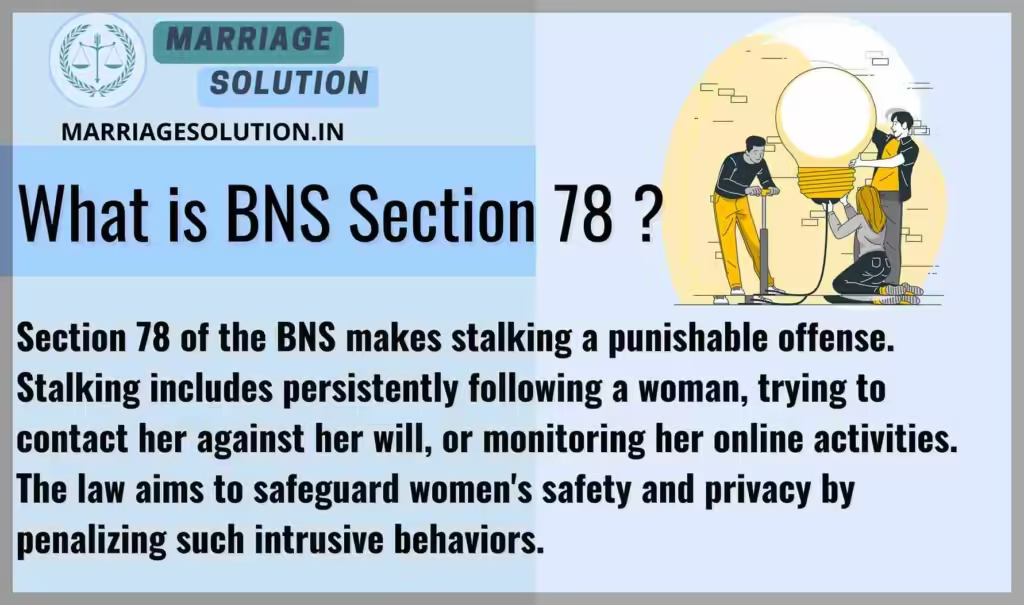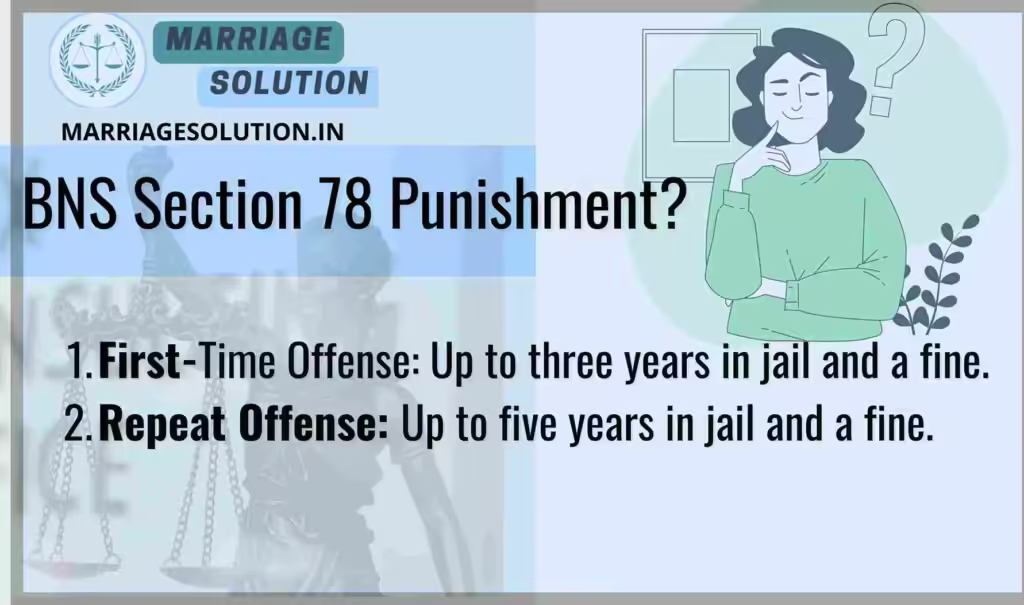Introduction of Section 78 BNS
BNS Section 78 and IPC Section 354D both deal with the serious offence of stalking a woman, whether in person or through electronic means. While IPC 354D was the earlier provision under the Indian Penal Code, it has now been shifted to the Bharatiya Nyaya Sanhita (BNS) with almost the same legal framework. This comparison helps readers clearly understand the similarities and minor procedural changes between the two sections regarding punishment, trial, and legal classification.
What is section 78 of BNS ?
Section 78 of the BNS makes stalking a punishable offense. Stalking includes persistently following a woman, trying to contact her against her will, or monitoring her online activities. The law aims to safeguard women’s safety and privacy by penalizing such intrusive behaviors.

BNS Section 78 in Simple Points
BNS Section 78 makes stalking a criminal offence in India. It deals with situations where a man repeatedly follows, contacts, or monitors a woman against her will, either physically or online. The purpose of this law is to protect women’s dignity, safety, and privacy in both public and digital spaces.
This provision replaces IPC Section 354D under the old Penal Code.
1. Meaning of Section 78 BNS
- Stalking → Repeatedly following, contacting, or trying to approach a woman without her consent.
- Cyberstalking → Monitoring her social media, emails, or online activities without permission.
- Against her will → The woman has clearly shown disinterest or refusal, but the man continues.
- Privacy protection → Ensures women are safe from unwanted attention in real life and online.
2. Essential Ingredients of Stalking
For Section 78 to apply, these conditions must be met:
- The accused is a man.
- He follows, contacts, or monitors a woman repeatedly.
- The woman has expressed disinterest or refused to engage.
- The act causes harassment, annoyance, or invasion of privacy.
Example → A man keeps waiting outside a woman’s college daily despite her asking him to stop.
3. Exceptions under Section 78
Stalking is not a crime if:
- The accused acted for crime prevention or investigation.
- He was performing legal duties as part of official authority.
- His actions were reasonable and justified under the circumstances.
This ensures that genuine police or lawful actions are not punished.
4. Punishment under Section 78 BNS
- First-Time Offence → Imprisonment up to 3 years + fine.
- Repeat Offence → Imprisonment up to 5 years + fine.
5. Nature of the Offence
- Bailable → First-time offence.
- Non-Bailable → Repeat offence.
- Cognizable → Police can arrest without a warrant.
- Non-Compoundable → Cannot be settled privately, must go through trial.
- Trial by → Any Magistrate.
6. Examples of Section 78 in Action
- Physical Stalking: A man follows a woman to her workplace daily despite warnings.
- Cyberstalking: Sending repeated messages and monitoring a woman’s social media after being blocked.
- Not an Offence: A police officer monitoring someone’s movement during an investigation.
7. Importance of Section 78
- Protects women’s freedom, dignity, and privacy.
- Recognizes modern digital harassment (cyberstalking).
- Acts as a deterrent against persistent harassment.
- Balances legal exceptions with individual rights.
Section 78 BNS Overview
BNS Section 78 is a law under the BNS that makes stalking a crime. Stalking means a man repeatedly tries to follow or contact a woman even after she has shown she does not want any interaction. It also covers situations where a man monitors a woman’s internet activities or electronic communications without her consent.
Overview of BNS Section 78
1. Stalking is a Crime
If a man repeatedly follows, contacts, or keeps track of a woman without her permission, it is called stalking. This is treated as a criminal offence under BNS Section 78.
Example: A man keeps following a woman from her office to her home every day, even when she asks him to stop.
2. Cyberstalking is also Included
Stalking is not just physical. It also covers online harassment, like sending repeated unwanted messages, checking her social media, or monitoring her online activities against her will.
Example: A man keeps creating new accounts to send messages to a woman after she blocks him.
3. Against Her Will
The law only applies if the woman clearly shows she is not interested. If she refuses to talk, blocks him, or tells him to stop, and he continues, then it becomes stalking.
Example: A woman tells a man not to message her again, but he keeps calling and texting her.
4. Protection of Privacy and Dignity
The purpose of this law is to protect women’s safety, dignity, and privacy. Stalking can cause fear, stress, and harassment, which is why the law treats it seriously.
Example: A woman feels unsafe walking home because someone follows her every day.
5. Exceptions to Stalking
Not every act of following or monitoring is stalking. If it is done by police for crime prevention, investigation, or legal duty, then it is not considered stalking.
Example: A police officer following a suspect during an investigation is not guilty of stalking.
6. First-Time Offence Punishment
If someone commits stalking for the first time, the punishment can be imprisonment up to 3 years and a fine.
Example: A man stalks a woman once and is caught—he may face up to 3 years in jail.
7. Repeat Offence Punishment
If a man stalks again after already being punished once, the punishment becomes stricter. For a repeat offence, he can face imprisonment up to 5 years and a fine.
Example: A man already punished for stalking does it again—he may now face up to 5 years in jail.
8. Bailable or Non-Bailable
- First-time offence → Bailable, meaning the accused can apply for bail.
- Repeat offence → Non-bailable, meaning bail is not easily given.
Example: A man caught stalking for the first time may get bail, but if he repeats it, bail becomes very difficult.
9. Cognizable and Non-Compoundable
Stalking is a cognizable offence, which means police can arrest without a warrant. It is also non-compoundable, meaning it cannot be settled outside court; the case must go through trial.
Example: Even if the woman agrees to forgive, the case will still be decided in court.
10. Importance of Section 78
This law is important because it helps protect women from unwanted harassment both in real life and in the digital world. It recognizes the problem of cyberstalking and ensures that women can live freely without fear.
Example: Women can now report stalking confidently, knowing that the law will protect them.
Examples of BNS Section 78 Violations
- Example 1: A man repeatedly waits outside a woman’s office to talk to her, even after she has told him not to. This behavior is stalking because he is ignoring her request to stop trying to interact with her.
- Example 2: A man checks a woman’s social media posts and sends her messages, even though she has blocked him and told him to stop. This is also stalking because he is monitoring her online activities without her consent.
BNS 78 Punishment
First-Time Offense: Up to three years in jail and a fine.
Repeat Offense: Up to five years in jail and a fine.

BNS 78 bailable or not ?
First-Time Offense: Bailable (the accused can apply for bail).
Repeat Offense: Non-bailable (harder to get bail)
Comparison: BNS Section 78 vs IPC Section 354D (Stalking)
| Section | Offence | Punishment | Bailable / Non-Bailable | Cognizable / Non-Cognizable | Trial By |
|---|---|---|---|---|---|
| BNS Section 78 | Stalking a woman physically or through electronic means, including following, monitoring, or contacting repeatedly against her will. | Imprisonment up to 3 years on first conviction, and up to 5 years on subsequent conviction, plus fine. | Bailable on first conviction; Non-Bailable on subsequent conviction | Cognizable | Magistrate of the First Class |
| IPC Section 354D (Old) | Stalking a woman by following her or contacting her repeatedly, including monitoring online activities, against her consent. | Same as BNS – imprisonment up to 3 years on first conviction, and up to 5 years on repeat conviction, plus fine. | Bailable on first conviction; Non-Bailable on subsequent conviction | Cognizable | Magistrate of the First Class |
BNS Section 78 FAQs
What is considered stalking under BNS Section 78?
Stalking includes following a woman, contacting her repeatedly despite her disinterest, or monitoring her online activities without her consent.
Are there any exceptions where stalking is not considered a crime?
Yes, if the stalking is done for crime prevention, is required by law, or is reasonable and justified, it may not be considered a crime.
What is the punishment for stalking under BNS Section 78?
For the first offense, imprisonment can extend up to three years and a fine. For subsequent offenses, imprisonment can extend up to five years and a fine.
Is stalking a bailable offense?
Yes, it is bailable for the first offense, but non-bailable for repeat offenses.
Which court handles cases under BNS Section 78?
Cases are triable by any Magistrate, depending on the severity of the offense and the specifics of the case.
Conclusion
Both BNS Section 78 and IPC Section 354D provide strong legal protection to women against stalking, harassment, and unwanted monitoring. The punishments remain similar, but under BNS, the law has been reorganized for clarity and modernization. This ensures that women’s safety and dignity are prioritized, both in physical and online spaces.
Need Legal Support?
If you are dealing with court cases, marriage problems, or any other legal issue, our team at Marriage Solution – Lawyer Help is here for you. Simply fill out our quick online enquiry form, and we’ll connect you with the right legal expert to support your needs.
Finished with BNS 78 ? Continue exploring the next provisions of the Bharatiya Nyaya Sanhita (BNS), 2023. Each section includes explanations, examples, and plain-language breakdowns for easy understanding.
- BNS Section 79 : Word, gesture or act intended to insult the modesty of a woman .
- https://marriagesolution.in/bns_section/bns-section-79/
Of Offences Relating To Marriage
- BNS 80 : Dowry death .
- https://marriagesolution.in/bns_section/bns-80/
- BNS 81 : Cohabitation caused by a man deceitfully inducing a belief of lawful marriage .
- https://marriagesolution.in/bns_section/bns-81/
- BNS Section 82 : Marrying again during lifetime of husband or wife.
- https://marriagesolution.in/bns_section/bns-section-82/
- Section 83 BNS : Marriage ceremony fraudulently gone through without lawful marriage .
- https://marriagesolution.in/bns_section/section-83-bns/
Full IPC Section List: https://marriagesolution.in/ipc-section-list
All Indian Law & Blogs: https://marriagesolution.in/indian-law/
Full BNSS Section List: https://marriagesolution.in/bnss_section-list
